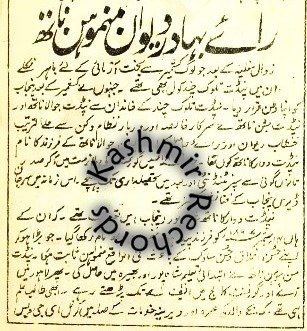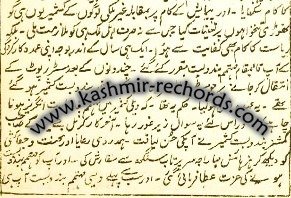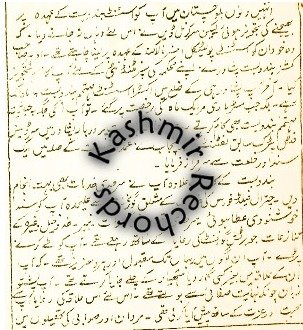(Kashmir Rechords Exclusive)
In the annals of pre-independence India, the name Rai Bahadur Dewan Manmohan Kaul stands out, not just for his administrative prowess but for his unique ability to connect with the diverse people he governed. Born on December 14, 1867, into a third-generation Kashmiri Pandit family in Punjab, Kaul’s journey from the academic corridors of Shahpur and Lahore to the challenging terrains of the frontier provinces is a tale of dedication, intelligence, and cultural empathy.

Early Life and Career
Kaul’s early education in Shahpur and subsequent F.A. degree from Lahore set the stage for a career marked by excellence. His academic brilliance and administrative skills caught the eye of Col. E.G. Vace, the Financial Commissioner of Punjab, who appointed him as Naib Tehsildar. Kaul’s ascent continued as he was promoted to Administrator Settlement and later appointed as Border Areas Development Commissioner. In this role, he administered the restive provinces of Swat, Buner, and Khad-o-Khel, among others.
Linguistic and Cultural Integration
One of Kaul’s most remarkable attributes was his fluency in Pashto, a language that endeared him to the local populace. Mohammad Din Fauq, one of Kashmir’s greatest historians, highlights this aspect in his seminal work on Kashmiris’ achievements. Kaul’s ability to speak the local language earned him immense respect and popularity, allowing him to navigate the frontier provinces without the need for an armed escort.

Rise to Prominence
Col. Henry Montgomery, the Settlement Commissioner of Punjab, recognizing Kaul’s capabilities, recommended him to the Maharaja of Kashmir for the position of Assistant Settlement Commissioner. Following the death of Mr. Rupert Murdoch, Kaul succeeded him and eventually took charge as the Settlement Commissioner in Kashmir. His tenure was marked by innovative initiatives, including a visionary plantation programme that provided employment to local residents and involved them in land revenue record-keeping.
Governorship and Reforms
Kaul’s exemplary work led to his appointment as the Governor of Kashmir on August 30, 1901. His governorship was characterized by relentless efforts to combat exploitative practices by traders, contractors, and octroi post agents. Kaul’s administration focused on infrastructure development, leading to the creation of new areas around Srinagar such as Raj Bagh, Gupkar, Munshi Bagh, and the Silk Factory. He also developed access roads to Gulmarg and Sonamarg, enhancing connectivity and trade.
Educational Contributions
Kaul was a staunch advocate for education, playing a pivotal role in elevating Sri Partap College and supporting institutions like the State High School and Islamia High School with generous financial grants. His contributions to education left a lasting impact on the region, fostering a culture of learning and progress.

Legacy and Reflections
Kaul’s legacy extended through his family, with his son, Maheshwar Nath Kaul, serving as the first Secretary of the Lok Sabha from 1947 to 1958. This remarkable lineage of service and excellence underscores the enduring contributions of the Kaul family to Indian society. Kashmir Rechords has already carried a detailed story about his son, which can be assessed at : https://kashmir-rechords.com/two-kashmiris-who-played-a-pivotal-role-in-indian-parliamentary-functioning/
Mohammad Din Fauq, reflecting on Kaul’s life and achievements, lamented that Kashmiris often excel outside their homeland—a sentiment that resonates even today. Manmohan Kaul’s story is a testament to the profound impact one individual can have through cultural empathy, administrative acumen, and an unwavering commitment to public service.